Hardcopy or #Hashtag? Young people call for a digital parliament
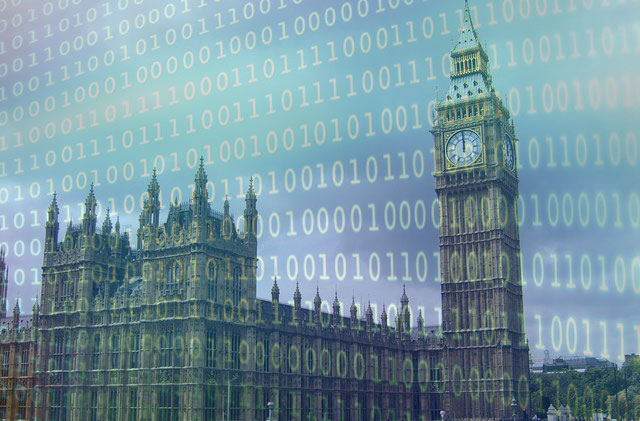
Tue, 04 Nov 2014 11:54:00 GMT
“...young people are increasingly reluctant to join political parties, do not trust politicians or understand the language they use, and feel excluded from politics...”
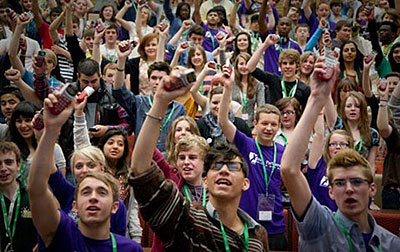
A persistent feature of British politics over the past decade or so has been growing anxieties amongst politicians, academics and commentators about rising levels of political disengagement, particularly amongst young people. Research has highlighted that young people are less engaged in traditional forms of politics, with only 44% of 18-24 year-olds voted in 2010. Moreover, young people are increasingly reluctant to join political parties, do not trust politicians or understand the language they use, and feel excluded from politics.
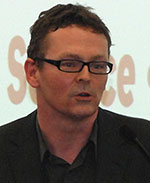 Academics at the University of Huddersfield have been at the forefront of national and local initiatives to politically engage young people and encourage democratic participation.
Academics at the University of Huddersfield have been at the forefront of national and local initiatives to politically engage young people and encourage democratic participation.
For example, Dr Andy Mycock has recently led a UK-wide initiative, Beyond the Youth Citizenship Commission, to encourage political parties to adopt youth-centric policies that increase political literacy and activism. He also worked with Kirklees Council on the project ‘My Country, My Vote’, that encourage young people in local schools to work on campaigning projects and sign on the electoral register.
An increasingly important issue is the need to better explore the role social media and digital technology can play in increasing youth engagement with parliamentary democracy in the United Kingdom and embrace new opportunities in a digital age.
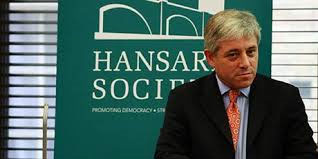 With this in mind, a Digital Democracy Commission was established by the Speaker of the House of Commons, Rt Hon John Bercow MP (pictured left), in November 2013 involving experts drawn from Parliament, academia, business and civil society. The Commission has been taking evidence from politicians, interest groups, students and the general public and will be publishing its report early in 2015 to coincide with the celebrations of the Magna Carta and the 750th birthday of Parliament. It will make recommendations on how parliamentary democracy can make better use of digital technologies in 5 areas: representing the people, making laws, scrutinising government, encouraging citizens’ engagement with democracy and encouraging citizen dialogue.
With this in mind, a Digital Democracy Commission was established by the Speaker of the House of Commons, Rt Hon John Bercow MP (pictured left), in November 2013 involving experts drawn from Parliament, academia, business and civil society. The Commission has been taking evidence from politicians, interest groups, students and the general public and will be publishing its report early in 2015 to coincide with the celebrations of the Magna Carta and the 750th birthday of Parliament. It will make recommendations on how parliamentary democracy can make better use of digital technologies in 5 areas: representing the people, making laws, scrutinising government, encouraging citizens’ engagement with democracy and encouraging citizen dialogue.
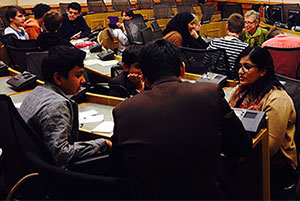 ‘Parliachat’ app
‘Parliachat’ app
Students from the University of Huddersfield recently hosted a regional workshop with members of the Kirklees Youth Council (pictured right) to discuss these issues in the council chamber of Huddersfield Town Hall. Working in small groups, the students and young councillors discussed their experiences of youth engagement with Parliament, identifying the benefits and limitations of greater digital democracy. They also ‘brainstormed’ ideas for using technology to enhance this engagement, providing a number of innovative suggestions for new ways to communicate with politicians and other young citizens.
All of the groups involved were keen to enhance the connectivity of young people with politicians and policy-makers, ensuring not only that their views were heard but that those ‘in power’ responded promptly and in language they understood. The winning idea was the creation of a new ‘app’ for mobile phones and other platforms called ‘Parlichat’ which would allow individuals and groups of young people to connect with MPs, local councillors, journalists and others involved in policy-making that affected them by social media. Politicians would be expected to host regular ‘video’ constituency meetings with local schools at set times and young people would also be able to discuss and vote on policy issues in a dedicated ‘chatroom’.
 Dr Mycock noted that the workshop had been a great success: “It once again emphasises the strong commitment of the University of Huddersfield and Kirklees Council to developing youth citizenship,” he said. The winning group will present their idea to with other students, academics and parliamentarians at a Parliament Week event in Westminster on Monday 17 November 2014. The Rt. Hon. John Bercow MP will also be discussing his ideas for the future of digital democracy when he delivers the University’s annual J.H. Whitley Lecture at Halifax Minster this Thursday, 6 November.
Dr Mycock noted that the workshop had been a great success: “It once again emphasises the strong commitment of the University of Huddersfield and Kirklees Council to developing youth citizenship,” he said. The winning group will present their idea to with other students, academics and parliamentarians at a Parliament Week event in Westminster on Monday 17 November 2014. The Rt. Hon. John Bercow MP will also be discussing his ideas for the future of digital democracy when he delivers the University’s annual J.H. Whitley Lecture at Halifax Minster this Thursday, 6 November.
- Booking details for John Bercow’s free lecture can be found on the University’s website.







